- #Development
Native App vs Hybrid App: What’s the Difference & What to decide on in 2022?
August 18, 2022 - by CrawlApps Technologies

August 18, 2022 - by CrawlApps Technologies

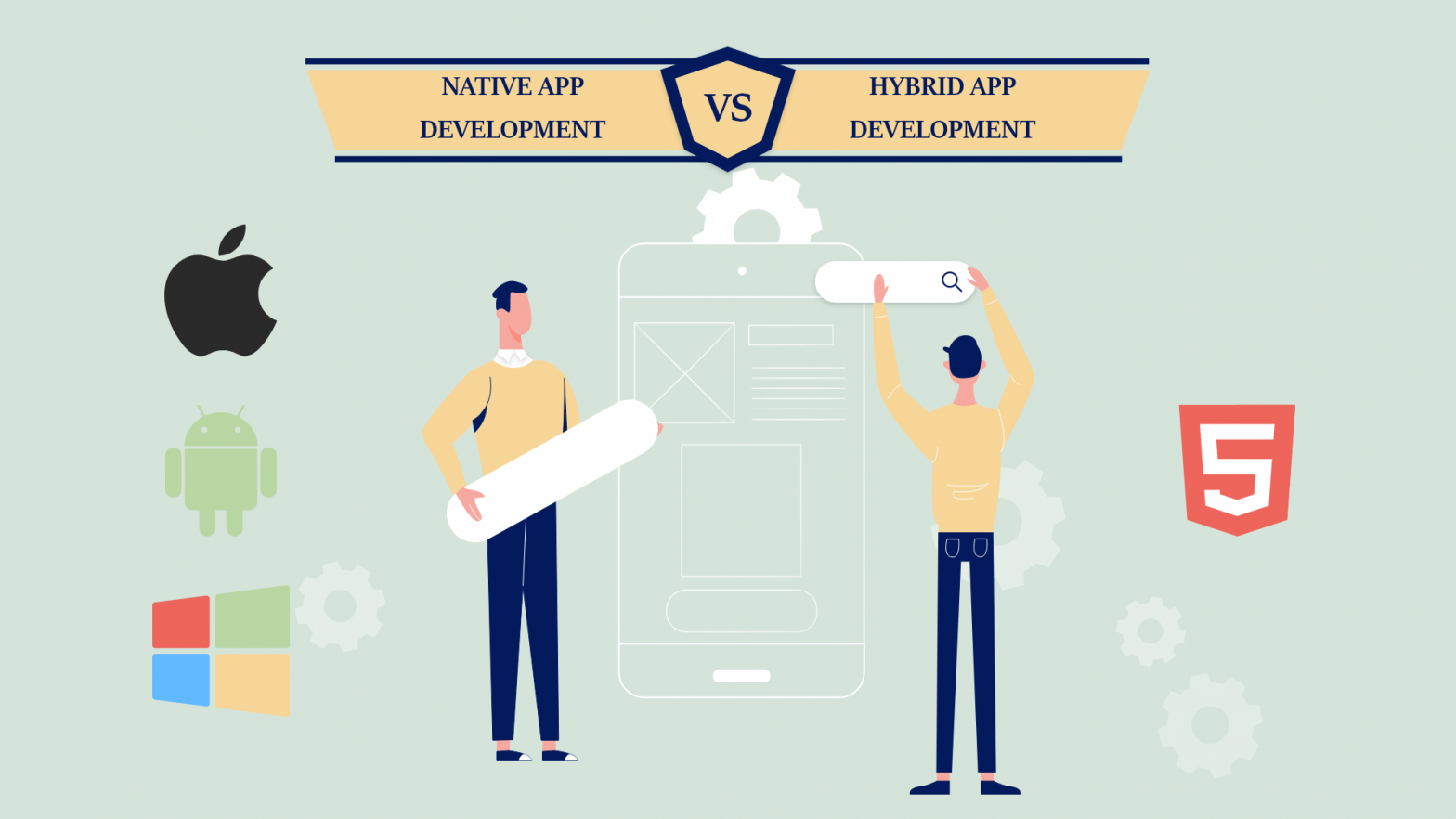
Today, mobile applications are one of the foremost dynamic business tools. Their efficiency in building up a reference to customers is unparalleled. a large style of service uses mobile apps to supply their users with a convenient experience.
Services starting from banking to car-pooling all use apps. Per Comscore, mobile users spend 90% of their time using applications, and only 10% on the web. Statistics predict that mobile apps will generate a revenue of $935.2 billion in 2023.
Investing in an exceedingly mobile app for your business right away is the best investment you can make.
There are many reasons that build up in favor of mobile apps for business. Mobile notifications interact directly with customers and keep them up to this point. The utilization of mobile apps over websites also helps improve customer retention.
The foremost popular mobile development platforms are iOS and Android. Most applications developed are for either or both of those platforms. The foremost crucial issue that companies must undergo during app development is whether or not they must build a native app or a hybrid app.
If you do not know the difference between the two, there’s no need to worry. Here is everything you wish to understand about native apps and hybrid apps.
In 2023, it’s estimated that the annual number of app downloads worldwide will amount to 299 billion, up from approximately 275 billion global app downloads in 2022.
With such stiff competition, business owners undergo the pressure of emphasizing more the standard, preciseness, functionalities, and other parameters that convince the potential customers to bank on their services over other alternatives.
At this time, businesses usually encounter multiple dilemmas like choosing the perfect technology to calculate for mobile app development services, choice of iOS or Android, or the app development framework best to grab wider customer engagement.
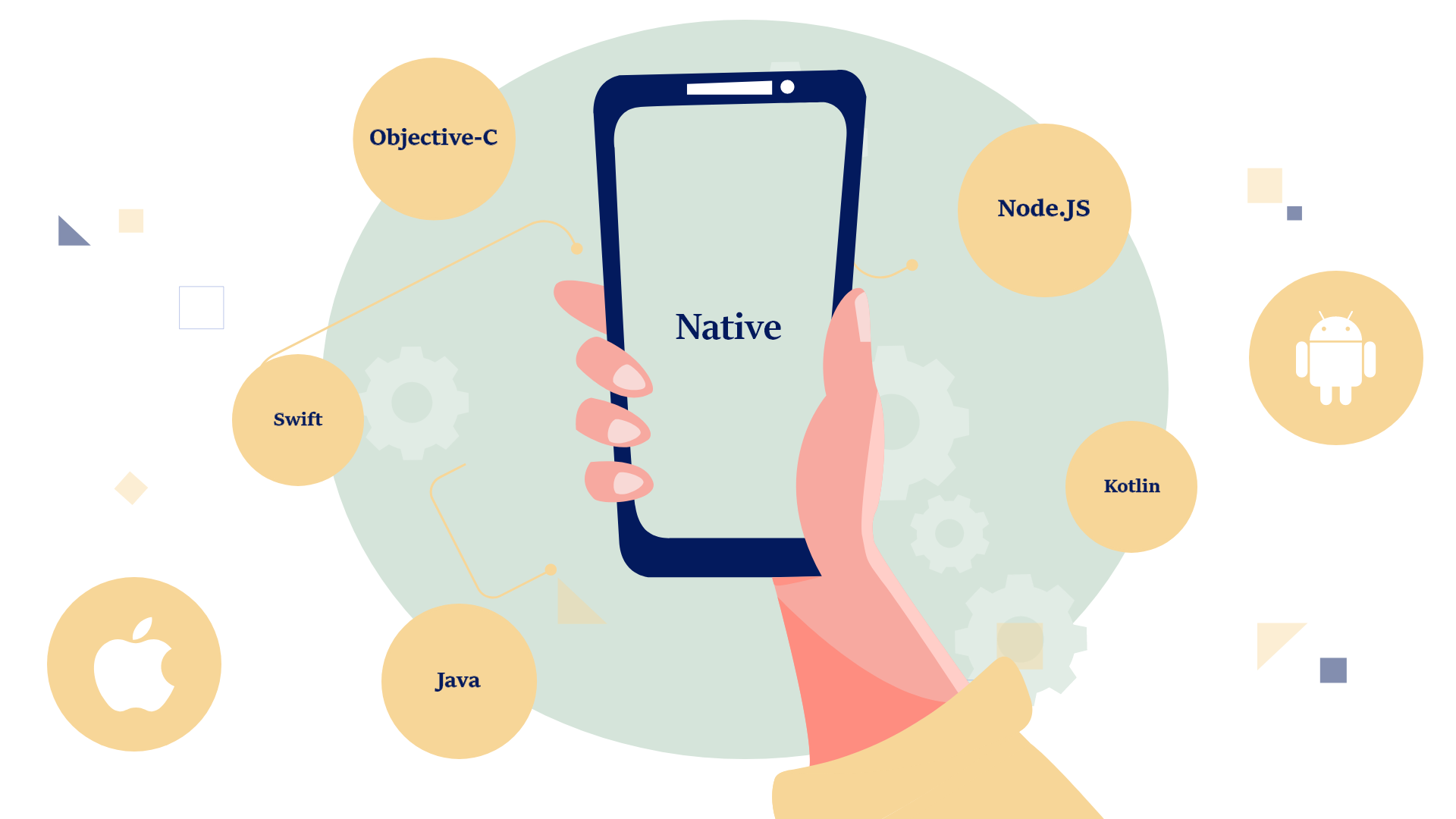
Native apps are programmed to figure with specific operating systems. An app coded for iOS won’t work with Android and vice-versa. Native mobile apps follow particular guidelines to boost user experience. Developers can build apps that leverage all the features of an OS. Native applications required developing separate apps for every platform. Hence, the event of such apps can take longer and value. The benefit though is better performance.
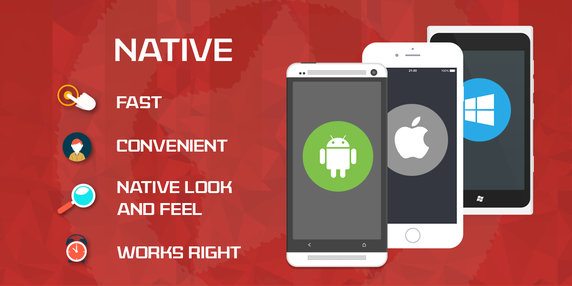
Enhanced User Experience
Native apps also can better utilize offline mode capabilities. specializing in one platform increases the efficiency of the app. The mixture of these factors improves the user experience.
Improved Performance
When an app is coded for a selected OS, it’s high-performance metrics. This can be thanks to better optimization of memory and storage achieved through code. Native mobile apps are easier to keep up and update.
Better Security
Unlike hybrid apps, native apps can fully utilize the hardware capabilities. Hence, it offers high data security to users. Can read more about the protection of apps here.
Functionality
Native app development offers access to the latest features as soon as they are launched so developers can easily integrate them within the app.
Personalization
Native app development offers access to the newest features as soon as they’re launched so developers can easily integrate them within the app.
Cost
With the increased complications of developing native mobile apps, the value increases too. The requirement for excellent resources and experienced developers makes the complete process expensive.
Time-Consuming
Since applications must be developed separately for both platforms, it requires longer. Even developing one native app takes more time than a hybrid mobile app.
Your audience is going to be using your app for the primary time and you intend to impress them with the most effective possible app experience.
Need to code specifically for one platform.
Businesses into 3D games and animations.
You are planning to grab a wide base of DAUs and target VC investors for product funding and develop an easy-to-learn yet intuitive app.
Need to add device-specific functionalities like GPS, camera, and so on.
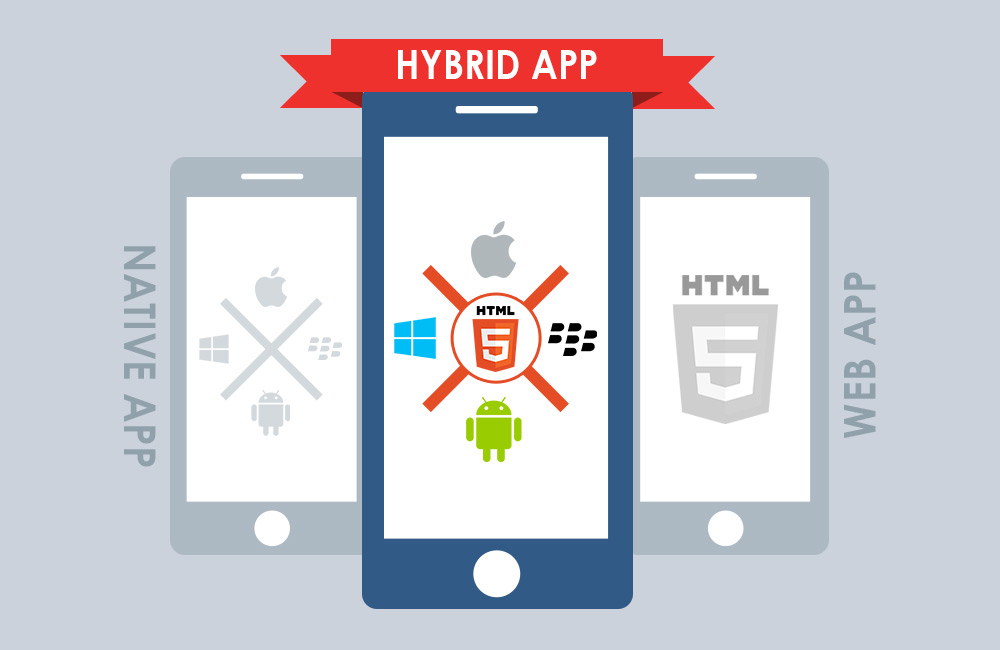
Hybrid apps are an amalgamation of both native and web app-building features. Developers are inclined towards such apps as they provide the flexibility of reusing code on various platforms and operating systems with little to no changes in the script. Instagram and Evernote are some highly efficient hybrid applications.
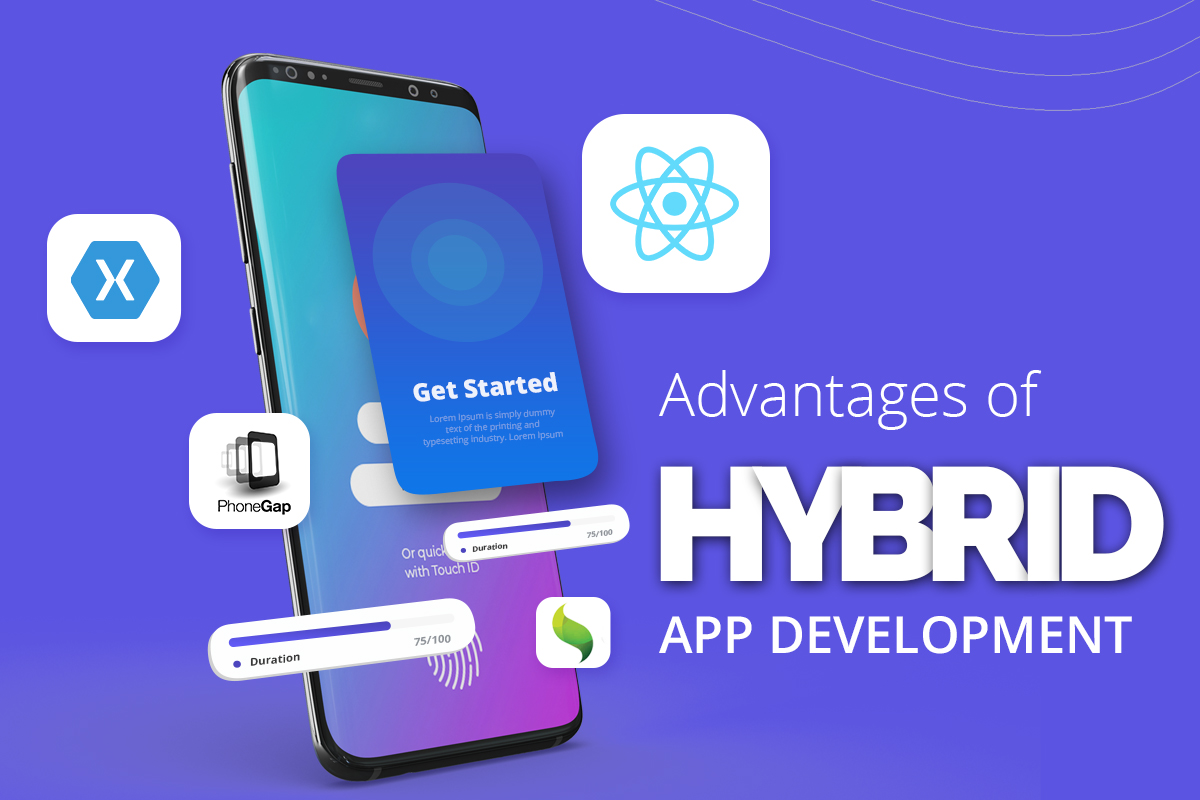
Accessible Across Multiple Platforms
Hybrid applications can run on both iOS and Android with the same base code since they do not have to develop separate codes for both platforms.
Saves Time
One code will run on both iOS and Android platforms. A hybrid app developer only has to work on a single code, making it very time-efficient.
Easy Maintenance
Since there is only one base code, it becomes effortless to update the program. There is no need for the user to download the latest version to fix a bug.
Pocket-Fixing
Only one base program needs to be built for both platforms, which drastically decreases development costs. As a result, it is much cheaper than native mobile apps.
Internet Connection Required
Since in some cases they’re basically websites wrapped in native apps, you would like to be connected to the net to use all features. This may not be true in the case of React Native.
Insufficient Interface
As the interface has to be compatible with both platforms, several functions are compromised. UI in hybrid apps isn’t as strong as in native apps.
Native App Developer Involvement
Many functionality issues in hybrid mobile apps require a native app developer to resolve them which could lead to additional costs.
Planning to operate the app seamlessly across different platforms and don’t have sufficient time to make a cross-platform solution.
You plan to distribute an internet app throughout app stores.
You are targeting a broader audience that uses the app on the web and mobile devices.
Minimum Viable Product (MVP) for testing the project idea.
You wish to avail the device’s native features like GPS, camera, and so on.
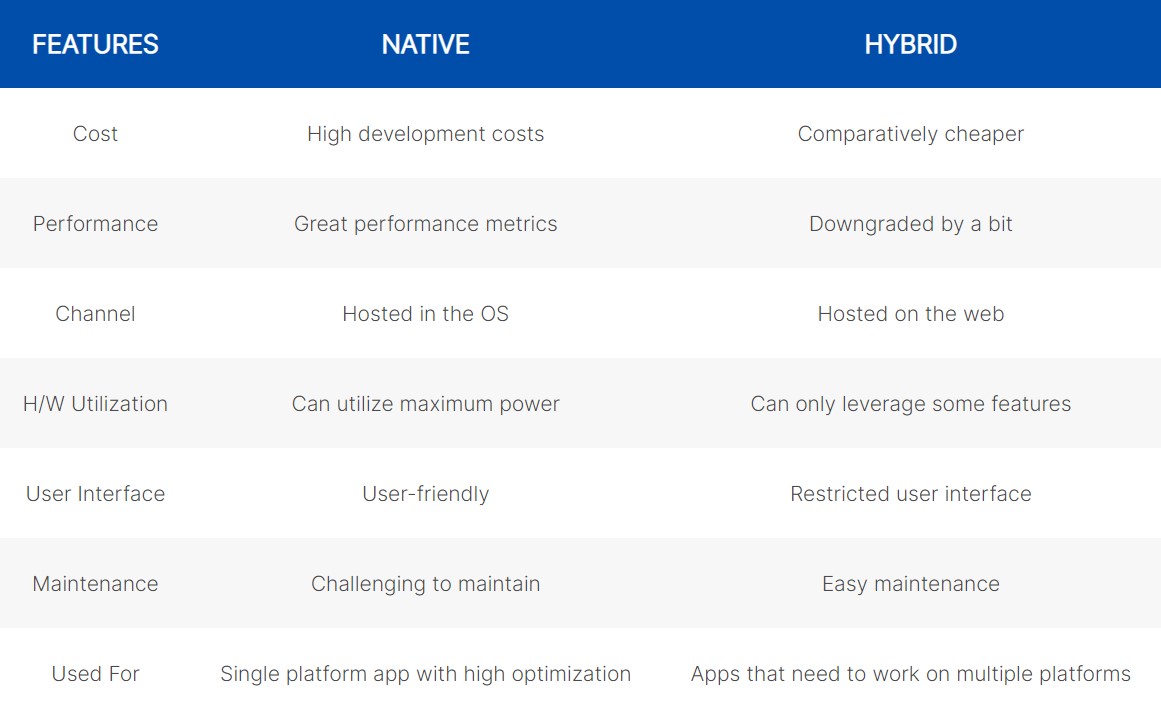
Native apps are developed specifically for one platform. Hence they are fast and deliver superior performance. They can be downloaded from various app stores and are not accessible through browsers.
Hybrid apps are an amalgamation of both native and web app-building features. Developers are inclined towards such apps as they provide the flexibility of reusing code on various platforms and operating systems with little to no changes in the script. Instagram and Evernote are some highly efficient hybrid applications.